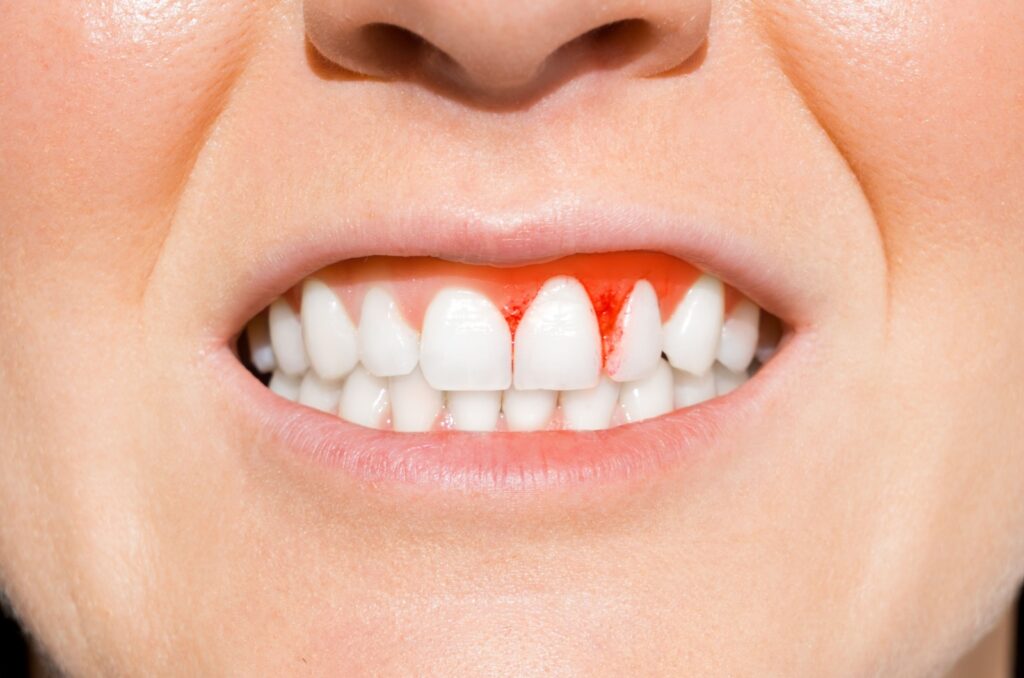When you think about your health, your teeth and gums might not top the list. But your oral health is deeply connected to your overall well-being.
For example, gum disease or periodontal disease can extend far beyond your mouth. But here’s the big question—can gum disease kill you? While gum disease isn’t a direct cause of death, it is a risk factor for cardiovascular disease.
Routine dental exams and cleanings can help detect signs of early-stage gum disease. Treatment can help prevent tooth loss and reduce the risk of serious health problems.
What Is Gum Disease?
Gum disease is a bacterial infection that affects the gums and other structures supporting the teeth. There are 2 forms of gum disease, ranging from mild to severe.
- Gingivitis
Gingivitis is the mildest form of gum disease that occurs when plaque builds up along the gumline. Plaque is a clear, sticky film containing bacteria that forms on your teeth and where the teeth and gums meet. The bacteria in the plaque mix with sugars from food and can harden into tartar without proper brushing and flossing.
Tartar can lead to gingivitis or inflammation of the gums. Symptoms of gingivitis include:
- Red, swollen gums
- Bleeding during brushing or flossing
- Bad breath
- Gum pain
The good news is that gingivitis is reversible with proper oral hygiene and care.
- Periodontitis
Without treatment, gingivitis can progress to periodontitis or periodontal disease—a more severe form of gum disease. Periodontitis affects the tissue and bone that supports your teeth, making it a major cause of tooth loss in adults. The inflammation from periodontitis can also seep into the bloodstream, potentially affecting overall health.
Symptoms of periodontitis include:
- Persistent bad breath
- Bleeding gums
- Gums that pull away from the teeth (receding gums)
- Loose teeth
- Pus from the gums
- Pain while chewing
Risk Factors for Gum Disease
Several factors can increase your risk of developing gum disease:
- Poor oral hygiene
- Poorly aligned teeth
- Smoking or tobacco use
- Hormonal changes in pregnancy
- Chronic conditions such as diabetes
- Stress
- A diet high in sugar or processed foods
Can Gum Disease Kill You?
While gum disease alone is unlikely to cause death, its indirect effects on your body can be life-threatening. Severe gum disease is a risk factor for several systemic health conditions, such as:
- Individuals with periodontitis are almost twice as likely to have cardiovascular disease than individuals without severe gum disease. The bacteria in periodontal disease may contribute to small clots that can clog heart arteries, increasing your risk of heart attacks.
- Oral infections can cause complications with diabetes. The bacteria from severe gum disease may increase blood sugar levels and the amount of time the body struggles with high blood sugar.
- Bacteria from infected gums can travel to the lungs, exacerbating respiratory infections.
- Pregnant individuals with gum disease are at a higher risk of preterm labour and low birth weight.
Debunking Myths
It’s essential to separate facts from fear. Gum disease is a serious condition, but it’s also preventable and manageable with the right care. Its connection to life-threatening illnesses underscores the importance of oral health. While not everyone with gum disease faces imminent danger, early detection and treatment are the keys to staying healthy.
Prevention and Treatment of Gum Disease
Maintaining good oral hygiene can help prevent gum disease:
- Brush your teeth twice a day with fluoride toothpaste.
- Floss daily to remove plaque from between your teeth and gums.
- Eat a balanced diet with plenty of fresh fruits and vegetables.
- Avoid smoking and limit sugary snacks.
Modern dentistry offers a range of treatments for gum disease:
- Non-surgical treatments: Deep cleaning procedures like scaling and root planing remove plaque and tartar from below the gum line.
- Medications: Antibacterial gels and mouth rinses can help control infection.
- Surgical options: Advanced cases may require treatment by a periodontist to restore or regenerate bone and gum tissue lost in severe cases.
The Importance of Regular Dental Check-Ups

Visiting your dentist every six months is more than just a box to tick. During these check-ups, they can identify early signs of gum disease before it progresses. Professional cleanings are also vital as they can remove tartar and plaque that regular brushing can’t tackle.
Health Starts in Your Mouth
Your oral health isn’t something to overlook. Gum disease is more than a cosmetic or comfort issue—it can tell a lot about your overall health. When you maintain your oral health, you take the necessary steps that also protect your entire body.
If it’s been a while since your last dental visit, now’s the perfect time to act. At Marks Dentistry, our experienced team is here to help you maintain healthy gums and a happy smile. Take charge of your oral health, and book an appointment today for personalized treatment options to achieve your dental goals.




